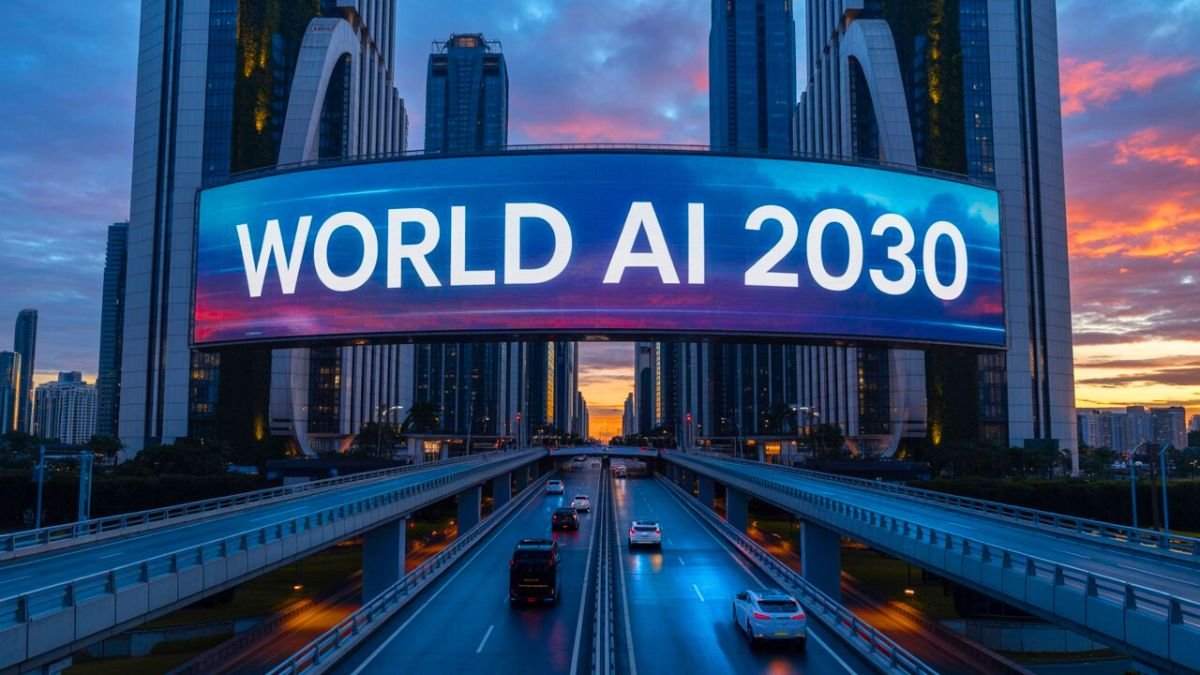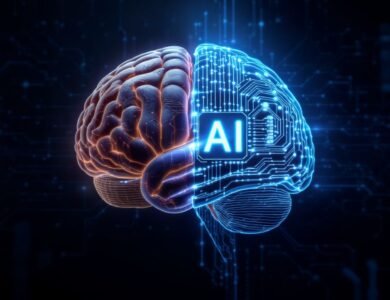
The future of artificial intelligence is bright, with big plans for healthcare, finance, and education. As tech gets better, AI will change how we live and work.
Experts say, “AI is not just a technology; it’s the start of a new era.” This means a big change is coming, making AI a thrilling and fast-growing field.
Key Takeaways
- The future of AI is closely tied to advancements in various sectors.
- AI has the power to change industries like healthcare and finance.
- Education will also see a big change with AI’s help.
- The role of AI in shaping the future is huge.
- As AI tech gets better, we’ll see new and cool uses.
The Current State of AI and Its Rapid Evolution
AI has made big strides in areas like large language models and quantum computing. Its effects on many industries and our daily lives are growing stronger.
Right now, most people don’t use advanced AI much. But, this will change soon. AI will become a big part of our lives, leading to a artificial intelligence revolution.
Breakthrough Technologies Driving AI Advancement in 2023
Several new technologies are pushing AI forward. Large language models and generative AI are changing how we talk to computers.
Large Language Models and Generative AI
Large language models can understand and create human-like language. This is changing how we use AI in customer service, translation, and making content. Generative AI is also opening up new ways to be creative and innovative.
Quantum Computing Applications for AI
Quantum computing is set to greatly impact AI. It offers huge computing power, solving problems that regular computers can’t. This could lead to big advances in drug discovery and climate modeling, fitting with AI technology trends 2030.
“The integration of quantum computing with AI has the power to change many fields. It will let us analyze huge datasets that were once out of reach.”
Key Industry Leaders and Research Institutions Shaping Tomorrow’s AI
Many big companies and research places are leading in AI. Firms like Google, Microsoft, and IBM are spending a lot on AI research. Places like MIT and Stanford are exploring AI’s limits.
Why AI Can Change Everything in2030
By 2030, AI will change society a lot. It will grow fast and be easier to use. AI will make our lives better in many ways, like making us more productive and helping with health and education.
Exponential Growth in Computing Power and Capabilities
AI’s power will grow fast. This means AI can handle lots of data quickly. It will make big improvements in talking to machines and predicting things.
This growth will help solve big problems. We’ll see big changes in medicine, finance, and science about the weather.
Integration of AI into Critical National Infrastructure
AI will also change how we run important systems. It will make energy, transport, and health systems better. They will work more smoothly and be more reliable.
For example, AI can predict when things might break. This helps avoid big problems and keeps things running smoothly.
Democratization of AI Tools Creating Universal Access
AI is becoming easier for everyone to use. This is thanks to open-source AI platforms and low-code AI development environments. These tools make it simple to use AI, no matter who you are.
Open-Source AI Platforms Gaining Momentum
More people are using open-source AI platforms. These platforms let developers work together. They share ideas and speed up AI progress.
Low-Code AI Development Environments
Low-code AI tools are also becoming popular. They let people without tech skills build AI models. These tools make it easy to create and use AI.
AI’s impact on society will be huge. By understanding why, we can get ready for these changes. We can make sure AI makes our lives better.
Economic Transformation: AI’s Impact on Global Markets
AI technology is moving fast, showing its big impact on the world economy. It changes many parts of the economy, like jobs and new business ideas.
Job Market Disruption and Creation: New Reports and Forecasts
AI will change the job market a lot. It might take some jobs but also create new ones in AI fields. Experts say the job market will change based on how well people adapt to new tech.
Key statistics on job market transformation:
| Category | Projected Change by 2030 |
|---|---|
| Jobs at High Risk of Automation | 15% decrease |
| New Jobs Created by AI | 10% increase |
| Jobs Requiring AI Skills | 25% increase |
Emerging Business Models Driven by AI Innovation
AI is bringing new business ideas to many fields. Companies use AI to improve customer service, make things run better, and create new products. This could make businesses more competitive and help the economy grow.
Economic Value Projections: $15.7 Trillion Global Impact by 2030
Experts think AI could add about $13 trillion to the global economy by 2030. Some say it could be even more, up to $15.7 trillion. This shows how important AI will be in the next decade for the economy.
Healthcare Revolution Through Artificial Intelligence
AI is changing healthcare in many ways, from making medicine more personal to improving diagnosis. “AI-powered systems are already driving more accurate diagnoses, personalized treatments, and efficient medical workflows.” This change is set to keep transforming the healthcare world.
Personalized Medicine Breakthroughs and Treatment Optimization
AI is making personalized medicine a reality. It can look at lots of data, like genetic profiles and medical histories. This lets doctors tailor treatments to fit each person’s needs, leading to better health outcomes.
AI-Powered Drug Discovery Accelerating Development Timelines
AI is speeding up drug discovery. AI algorithms can guess how well and safely new drugs will work. This makes it easier to get new treatments to people faster.
Disease Prediction Systems Changing Preventative Care
AI is changing how we prevent diseases. It can spot health problems early. This means doctors can act sooner, helping patients and saving money.
AI-Assisted Surgery and Medical Diagnostics Becoming Standard
AI is making surgery and diagnosis better. It helps doctors see more clearly and make precise decisions. This leads to better care for patients.
AI in healthcare is more than a trend; it’s a big change. As AI grows, its impact on society will be huge, shaping the future of health care.
Transportation and Mobility Transformed by AI
As we look towards 2030, AI’s role in transportation and mobility is clear. It’s not just about making things better. It’s about changing them completely.
Autonomous Vehicle Technology Reaching Commercial Viability
Autonomous vehicle technology is a big leap forward. “Autonomous vehicles will likely dominate by 2030,” making travel safer and greener. Companies are pouring money into this tech, hoping to change how we get around.
Autonomous vehicles will cut down on accidents and make traffic flow better.
Smart Traffic Management Systems Reducing Urban Congestion
AI is also making traffic smarter. It uses real-time data to predict and solve traffic jams. This cuts down travel times and improves air quality, which is key in cities.
“The future of transportation is not just about the vehicles themselves, but about creating a smarter, more integrated transportation network.” – Expert in AI and Transportation
AI-Optimized Logistics Reshaping Global Supply Chains
AI is also changing logistics and supply chains. It optimizes routes and cuts costs, making deliveries faster. This is a big deal for global trade.
In summary, AI is set to change transportation and mobility by 2030. With advancements in self-driving cars, smart traffic, and logistics, the future looks bright. It promises a safer, more efficient, and sustainable way to travel.
AI’s Role in Addressing Climate Change and Sustainability
The artificial intelligence revolution is set to play a big role in tackling climate change and promoting green practices. Experts say AI will help find big solutions to environmental problems.
AI can make a big difference in making energy grids more efficient. Predictive AI systems help manage energy better, cutting down on waste and emissions.
Energy Grid Optimization Through Predictive AI Systems
Predictive AI looks at past data and current info to predict energy needs. This lets energy suppliers adjust to meet demand better. It reduces strain on the grid and cuts down on fossil fuel use, lowering emissions.
Enhanced grid management through AI makes energy systems more reliable and flexible. They can handle more renewable energy sources better.
Environmental Monitoring Networks Using Advanced AI Models
AI-driven networks track changes in nature, watch wildlife, and spot early signs of damage. They use advanced AI to analyze data from satellites and sensors. This gives a full picture of environmental health.
These networks help focus conservation efforts. They help save biodiversity and keep ecosystems balanced.
Sustainable Manufacturing Processes Guided by AI
AI can make manufacturing better by predicting when things need fixing, cutting waste, and improving how resources are used. This makes production more eco-friendly, reducing the environmental impact of making things.
Sustainable manufacturing with AI’s help is good for the planet and makes operations more efficient and cheaper.
Ethical Considerations and Emerging Regulatory Frameworks
AI technologies are advancing fast, raising big ethical questions. We need strong ethical rules and laws to make sure AI helps us, not harms us. As AI touches more parts of our lives, we must have clear guidelines and rules.
Privacy Protection in an AI-Saturated Environment
Privacy is a big worry with AI. AI uses lots of personal data, which can be a security risk. It’s key to make sure AI respects our privacy.
Combating Algorithmic Bias: New Standards and Approaches
AI can also show bias if it’s trained on biased data. We need new ways to stop this. Fair AI systems are important for everyone.
International Governance Initiatives for AI Technologies
Worldwide, there are efforts to manage AI’s global impact. These efforts aim to create shared rules for AI’s use and development.
EU AI Act and Its Global Implications
The EU AI Act is a big step in AI rules. It sorts AI systems by risk level and has strict rules for the most risky ones.
US National AI Strategy Development
The US is working on its AI plan too. It wants to boost AI innovation and tackle its ethical sides. This includes funding AI research and getting the workforce ready for AI jobs.
| Region | Regulatory Approach | Key Features |
|---|---|---|
| EU | Comprehensive Regulation | Risk-based categorization, strict requirements for high-risk AI |
| US | National Strategy | Promoting innovation, addressing ethical implications, workforce development |
Social Implications of Widespread AI Adoption
AI technology is advancing fast, and we need to understand its social effects. As AI becomes a big part of our lives, it will change many parts of society.
Evolution of Human-Computer Interaction Paradigms
How we talk to technology is changing a lot because of AI. Advances in natural language processing and machine learning make interfaces more natural and personal. This makes technology easier to use.
AI-powered virtual assistants are getting more common. They help us do things faster. As AI gets better, we’ll see even more cool ways to interact with technology.
Educational Systems Transforming for the AI Era
AI is changing education in big ways. AI-driven adaptive learning systems adjust lessons for each student. This could make learning better. AI also helps teachers with grading and checking student work.
But, this change also makes us think about teachers’ roles and the need for new skills. As AI changes education, we must tackle these issues head-on.
Addressing the Digital Divide in AI Access and Benefits
AI’s spread could make existing inequalities worse. Ensuring everyone has access to AI technologies and their benefits is key to avoiding a new digital divide. Governments, businesses, and civil society must work together to make AI more inclusive.
By facing these challenges, we can ensure AI’s benefits are for everyone. The future of AI in 2030 will depend on how well we handle these social issues.
Navigating Our AI-Powered Future: Opportunities and Challenges Ahead
We are on the edge of a new decade, and AI is changing everything. It’s not just about tech; it’s about our world’s future. Knowing how AI will change everything in2030 is key to facing what’s coming.
AI’s future is full of hope, from changing industries to making our lives better. But, we must think carefully about how to use AI right. This means making sure it’s developed and used responsibly.
As AI gets smarter, we need to tackle its challenges. This includes keeping our data safe, avoiding AI bias, and setting global rules for AI.
By tackling these issues, we can make AI work for the good of all. The future of AI is about more than tech. It’s about making a better world for everyone.



